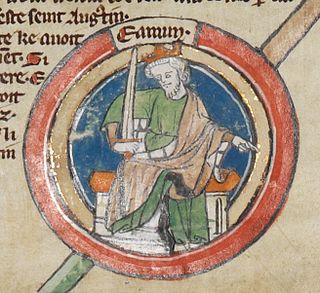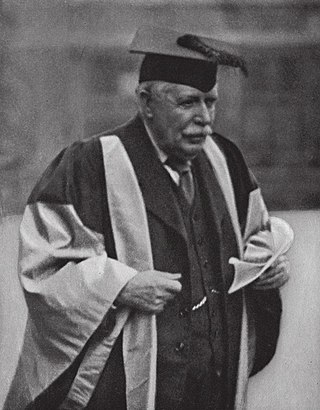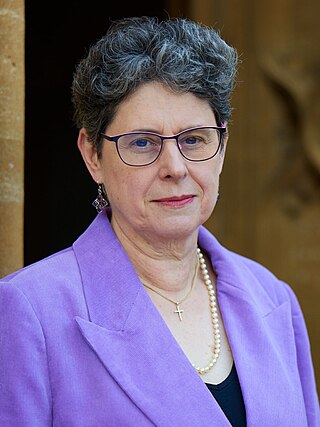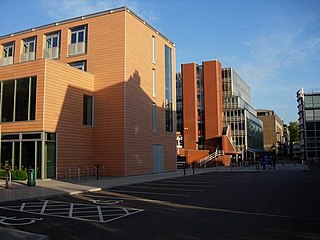Related Research Articles

Edmund I or Eadmund I was King of the English from 27 October 939 until his death in 946. He was the elder son of King Edward the Elder and his third wife, Queen Eadgifu, and a grandson of King Alfred the Great. After Edward died in 924, he was succeeded by his eldest son, Edmund's half-brother Æthelstan. Edmund was crowned after Æthelstan died childless in 939. He had two sons, Eadwig and Edgar, by his first wife Ælfgifu, and none by his second wife Æthelflæd. His sons were young children when he was killed in a brawl with an outlaw at Pucklechurch in Gloucestershire, and he was succeeded by his younger brother Eadred, who died in 955 and was followed by Edmund's sons in succession.

The witan was the king's council in the Anglo-Saxon government of England from before the 7th century until the 11th century. It comprised important noblemen, including ealdormen, thegns, and bishops. Meetings of the witan were sometimes called the witenagemot.

Edgar was King of the English from 959 until his death in 975. He became king of all England on his brother's death. He was the younger son of King Edmund I and his first wife Ælfgifu. A detailed account of Edgar's reign is not possible, because only a few events were recorded by chroniclers and monastic writers were more interested in recording the activities of the leaders of the church.

Eadred was King of the English from 26 May 946 until his death in 955. He was the younger son of Edward the Elder and his third wife Eadgifu, and a grandson of Alfred the Great. His elder brother, Edmund, was killed trying to protect his seneschal from an attack by a violent thief. Edmund's two sons, Eadwig and Edgar, were then young children, so Eadred became king. He suffered from ill health in the last years of his life and he died at the age of a little over thirty, having never married. He was succeeded successively by his nephews, Eadwig and Edgar.

Hilda Roderick Ellis Davidson was an English folklorist. She was a scholar at the University of Cambridge and The Folklore Society, and specialized in the study of Celtic and Germanic religion and folklore.
Jane Barbara Stevenson is a British historian, literary scholar, and author.

Hector Munro Chadwick was an English philologist. Chadwick was the Elrington and Bosworth Professor of Anglo-Saxon and the founder and head of the Department for Anglo-Saxon and Kindred Studies at the University of Cambridge. Chadwick was well known for his encouragement of interdisciplinary research on Celts and Germanic peoples, and for his theories on the Heroic Age in the history of human societies. Chadwick was a tutor of many notable students and the author of numerous influential works in his fields of study. Much of his research and teaching was conducted in cooperation with his wife, former student and fellow Cambridge scholar Nora Kershaw.

Nora Kershaw Chadwick CBE FSA FBA was an English philologist who specialized in Anglo-Saxon, Celtic and Old Norse studies.

Dorothy Whitelock, was an English historian. From 1957 to 1969, she was the Elrington and Bosworth Professor of Anglo-Saxon at the University of Cambridge. Her best-known work is English Historical Documents, vol. I: c. 500-1042, which she edited. It is a compilation of translated sources, with introductions.
Oliver James Padel is an English medievalist and toponymist specializing in Welsh and Cornish studies. He is currently Honorary Research Fellow in the Department of Anglo-Saxon, Norse, and Celtic, in the University of Cambridge. and visiting professor of Celtic at the University of the West of England

Sarah Rosamund Irvine Foot, is an English Anglican priest and early medieval historian. She has been Regius Professor of Ecclesiastical History at the University of Oxford since 2007, and Dean of Christ Church, Oxford since 2023.
Kathleen Winifred Hughes was an English historian, her specialisation was Irish ecclesiastical history, particularly the early Christian Church in Ireland.
Ælfgifu of Shaftesbury was the first wife of King Edmund I. She was Queen of the English from her marriage in around 939 until her death in 944. Ælfgifu and Edmund were the parents of two future English kings, Eadwig and Edgar. Like her mother Wynflaed, Ælfgifu had a close and special if unknown connection with the royal nunnery of Shaftesbury (Dorset), founded by King Alfred, where she was buried and soon revered as a saint. According to a pre-Conquest tradition from Winchester, her feast day is 18 May.

The Department of Anglo-Saxon, Norse and Celtic is one of the constituent departments of the University of Cambridge, and focuses on the history, material culture, languages and literatures of the various peoples who inhabited Britain, Ireland and the extended Scandinavian world in the early Middle Ages. It is based on the second floor of the Faculty of English at 9 West Road. In Cambridge University jargon, its students are called ASNaCs.
Audrey Lilian Meaney was an archaeologist and historian specialising in the study of Anglo-Saxon England. She published several books on the subject, including Gazetteer of Early Anglo-Saxon Burial Sites (1964) and Anglo-Saxon Amulets and Curing Stones (1981).
Florence Elizabeth Harmer FBA was an English historian, specializing in the Anglo-Saxon period. Translating from Old English and Latin, she edited a number of primary sources for early English history, and her Anglo-Saxon Writs (1952) remains a standard text.
Dorothy De Navarro (1901–1987) was a lecturer at the University of Cambridge, who specialised in Anglo-Saxon literature.

Ælfwynn or Ælfwyn was a member of a wealthy Anglo-Saxon family in Huntingdonshire who married Æthelstan Half-King, the powerful ealdorman of East Anglia, in about 932. She is chiefly known for having been foster-mother to the future King Edgar the Peaceful following his mother's death in 944, when he was an infant. She had four sons, and the youngest, Æthelwine, became the chief secular magnate and leading supporter of the monastic reform movement. Ælfwynn donated her estates for his foundation of Ramsey Abbey in 966 and was probably buried there.

Dish-bearers and butlers were thegns who acted as personal attendants of kings in Anglo-Saxon England. Royal feasts played an important role in consolidating community and hierarchy among the elite, and dish-bearers and butlers served the food and drinks at these meals. Thegns were members of the aristocracy, leading landowners who occupied the third lay (non-religious) rank in English society after the king and ealdormen. Dish-bearers and butlers probably also carried out diverse military and administrative duties as required by the king. Some went on to have illustrious careers as ealdormen, but most never rose higher than thegn.
Maureen Margaret O’Reilly was a British academic who taught Anglo-Saxon archaeology and Anglo-Saxon, Norse and Celtic languages at the University of Cambridge and was an assistant curator of the Museum of Archaeology and Ethnography in the 1920s and 30s.
References
- ↑ Naismith, Rory (2016). "The Ely memoranda and the economy of the late Anglo-Saxon fenland". Anglo-Saxon England. 45: 336. doi:10.1017/S0263675100080327. S2CID 163878432.
- ↑ Keynes, Simon (2011). "Introduction to the Paperback Edition". In Harmer, F. E. (ed.). Select English Historical Documents of the Ninth and Tenth Centuries. Cambridge, UK: Cambridge University Press. p. i. ISBN 978-1-107-40222-5.
- ↑ 'Appendix VIII', in H. M. Chadwick and the Study of Anglo-Saxon, Norse and Celtic in Cambridge, ed. by Michael Lapidge (Aberystwyth: Department of Welsh, Abersytwyth University, 2015), ISBN 9780955718298
- ↑ Robertson, Agnes Jane, ed. (2009) [1956]. Anglo-Saxon Charters (2nd ed.). Cambridge, UK: Cambridge University Press. Title page. ISBN 978-0-521-17832-7.
- ↑ "News and Events, Centre for Celtic & Anglo-Saxon Studies, University of Aberdeen". Archived from the original on 28 January 2021. Retrieved 26 August 2021.
- ↑ Robertson, A.J., ed. (1925). The Laws of the Kings of England from Edmund to Henry I. Edited and translated by A.J. Robertson. Cambridge, UK: Cambridge University Press. OCLC 560461322.
- ↑ Robertson, Anglo-Saxon Charters